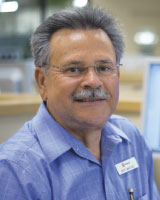To Be or Not to Be…Certified
 Certification adds a third dimension to your portfolio; education and experience are the other two.
Certification adds a third dimension to your portfolio; education and experience are the other two.
In baseball, we look for a player with the complete package—one who can throw, bat, catch, run, and be smart enough to make the many quick decisions that inevitably impact the outcome of a game. Certification in our industry mimics this complete package. It lets people know that you have, in addition to experience and education, specialization in fluid power and that you have taken the time to document your expertise. It lets the world know you are a critical member of the “team.”
Fluid power has had many innovations since the 1980s. Probably the most significant is proportional controls. Fast forward 30 years and all of a sudden we are dealing with programmable logic controllers, motion controllers, analog and digital drivers, load cells, linear variable displacement transducers (LVDT), proportional integral derivative (PID) controllers—the list goes on and on. These innovative technologies require in-depth knowledge of electronics in addition to basic hydraulics.
Fluid power isn’t just for log splitting anymore. In addition to electronics, advances in proportional valve technology and servo valve technology have allowed fluid power to reach into applications that used to be reserved for the electromechanical industry. Again, applying these valves requires knowledge of frequency response technology and closed-loop controls. Certification is a key way of keeping up with this technology and letting your industry know that you have the fundamental knowledge necessary to apply it.
When I first heard of fluid power certification in the early 90s, I was very interested. I saw it as a way to achieve a higher level of accomplishment. Monetary gain was not the main motive. For me, it was more about pride and bragging rights. Since then, I have had many discussions with colleagues about the benefits of being certified. It’s funny how almost everybody who isn’t certified doesn’t feel the need to certify, whereas those who are certified are always looking for new certifications to add to their portfolios and other ways of growing professionally.
Recently, a group of young engineers that I work with decided to take the certification test. They were also joined by a few senior engineers motivated by the younger group. I met with them several times when they were preparing for the test. I reminded them that taking the test is not like running a race—it’s more like achieving a goal. So, if you don’t pass the first time, there’s no shame in going back and taking the test again and again. And again, until you pass. Afterward, while they all agreed that taking the test was no walk in the park, most of them passed the test. The one thing that impressed me the most was that one of the fellows who didn’t pass the test went ahead and re-took the test almost immediately. And he passed it. I don’t know who was more proud.
At the end of the day, it’s really up to us—on an individual level—to take the next step. If you haven’t gotten your certification, look into it. Get started by preparing to take the test. Don’t assume that just because you’ve been in fluid power for years you’re going to breeze through the test. It takes hard work and substantial preparation. But there is a light at the end of the tunnel, and the rewards of getting certified are real. You probably won’t become the next CEO of your company, but the CEO will surely look at you differently. So, too, will your customers and colleagues see you in a different professional light.
For those of you who have been certified, I urge you to promote the certification process as a positive experience for both the employer and the employee—not as a competitive challenge. This will simply drive people away.
As the industry continues to move forward in areas like energy recovery, energy-efficient systems, alternative energy, smart components, etc., the certification process will become increasingly beneficial and integral to our professional growth. With all of these fast-paced developments, I ask: Can you really afford not to be certified?
About the Author: Bert Martinez, CFPE, CMfgE, has 44 years of experience in hydraulic cartridge valves, integrated circuits, and electrohydraulics. He currently works in marketing/engineering for Sun Hydraulics.







